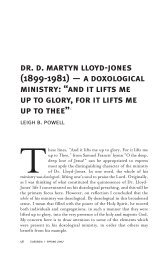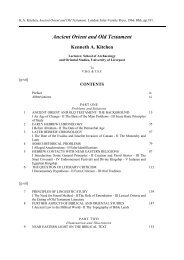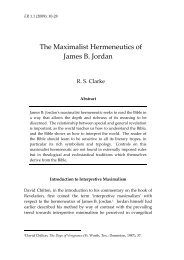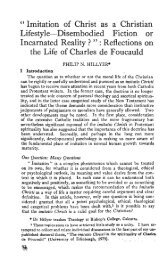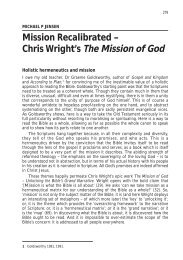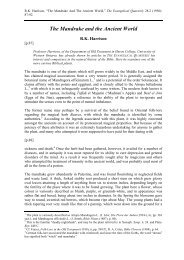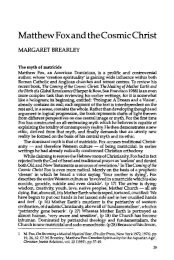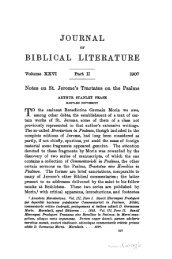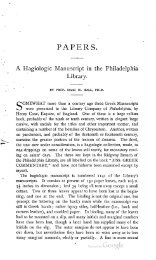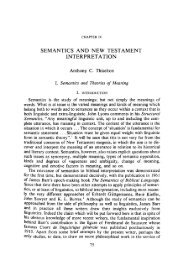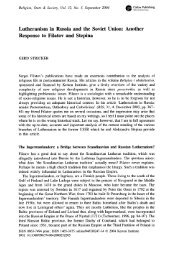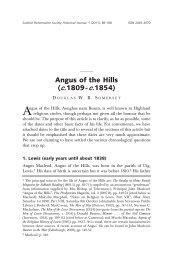The Language of the Epistle to the Hebrews as Bearing upon Its ...
The Language of the Epistle to the Hebrews as Bearing upon Its ...
The Language of the Epistle to the Hebrews as Bearing upon Its ...
You also want an ePaper? Increase the reach of your titles
YUMPU automatically turns print PDFs into web optimized ePapers that Google loves.
LANGUAGE OF THE EPISTLE TO THE HEBREWS.<br />
2I1<br />
It is plain from what h<strong>as</strong> been said, <strong>as</strong> well <strong>as</strong> from <strong>the</strong> common<br />
consent <strong>of</strong> students, that <strong>the</strong> author must be looked for among those<br />
companions <strong>of</strong> S. Paul who, through prolonged intercourse, were<br />
likely <strong>to</strong> have <strong>the</strong>ir modes <strong>of</strong> expression somewhat affected by his<br />
language. <strong>The</strong> number <strong>of</strong> <strong>the</strong>se is considerable, and after so many<br />
ages <strong>of</strong> uncertainty, beginning with <strong>the</strong> earliest discussion <strong>of</strong> <strong>the</strong><br />
subject, it is not likely that <strong>the</strong> right one can ever be pointed out<br />
with certainty. Many modern critics have selected Apollos <strong>as</strong> <strong>the</strong><br />
most probable author, chiefly because <strong>of</strong> <strong>the</strong> facts recorded <strong>of</strong> him in<br />
Acts xviii. 24-28, that he "w<strong>as</strong> born at Alexandria, an eloquent man<br />
and mighty in <strong>the</strong> Scriptures," and that after receiving fur<strong>the</strong>r instruction<br />
from Aquila and Priscilla, " he mightily convinced <strong>the</strong> Jews, and<br />
that publicly, showing by <strong>the</strong> Scriptures that Jesus w<strong>as</strong> Christ." He<br />
w<strong>as</strong> certainly personally known <strong>to</strong> S. Paul (i Cor. xvi. 12), although<br />
<strong>of</strong> <strong>the</strong> length <strong>of</strong> time <strong>the</strong>y may have been <strong>to</strong>ge<strong>the</strong>r we have no information.<br />
His being an Alexandrian is thought <strong>to</strong> explain what some<br />
are ple<strong>as</strong>ed <strong>to</strong> consider an Alexandrian <strong>to</strong>ne <strong>of</strong> thought in <strong>the</strong> epistle,<br />
and also <strong>the</strong> fact that its quotations are from <strong>the</strong> LXX, and accord<br />
ra<strong>the</strong>r with its Alexandrian than its Vatican recension. <strong>The</strong> force <strong>of</strong><br />
<strong>the</strong> l<strong>as</strong>t point is not obvious. In <strong>the</strong> meagreness <strong>of</strong> our knowledge<br />
<strong>of</strong> <strong>the</strong> original LXX, it appears probable that <strong>the</strong> so-called Alexandrian<br />
recension w<strong>as</strong> <strong>the</strong> one generally current in <strong>the</strong> Levant, and<br />
<strong>the</strong>refore that this indication, whatever it may be worth, simply points<br />
<strong>to</strong> an Oriental author. And so also whatever <strong>the</strong>re may be <strong>of</strong> an<br />
Alexandrian c<strong>as</strong>te <strong>of</strong> thought in <strong>the</strong> epistle only indicates some one<br />
familiar with Jewish-Alexandrian literature, and this would include<br />
almost every educated Jew living in <strong>the</strong> Levant.l At all events,<br />
nei<strong>the</strong>r <strong>of</strong> <strong>the</strong>se considerations seem <strong>to</strong> have occurred <strong>to</strong> any <strong>of</strong> those<br />
early Alexandrian scholars, Pantaenus, Clement, or Origen, who all<br />
speak <strong>of</strong> <strong>the</strong> authorship, <strong>the</strong> l<strong>as</strong>t at some length and with discrimination.<br />
<strong>The</strong> <strong>the</strong>ory <strong>of</strong> Apollos' authorship h<strong>as</strong>, however, this great<br />
advantage: that no line <strong>of</strong> his remains <strong>to</strong> compare with our epistle.<br />
It h<strong>as</strong> also <strong>the</strong>se disadvantages: that it never occurred <strong>to</strong> any ancient<br />
author, but w<strong>as</strong> first suggested by Lu<strong>the</strong>r; that <strong>the</strong>re is no evidence<br />
<strong>of</strong> any prolonged personal intercourse between him and S. Paul; and<br />
that <strong>the</strong>re is nothing <strong>to</strong> connect him with any especial interest in, or<br />
1 But that <strong>the</strong> style indicates that <strong>the</strong> <strong>Epistle</strong> w<strong>as</strong> not actually written by an<br />
Alexandrian may be ga<strong>the</strong>red from <strong>the</strong> non-use <strong>of</strong> <strong>the</strong> optative mood. See <strong>the</strong><br />
reference <strong>to</strong> Dr. Harman on p. Io. He remarks, "This is presumptive pro<strong>of</strong> that<br />
an Alexandrian did not write this epistle, <strong>as</strong> it is not likely that <strong>the</strong> use <strong>of</strong> this<br />
mode in but one instance would have satisfied his fine Greek t<strong>as</strong>te."




